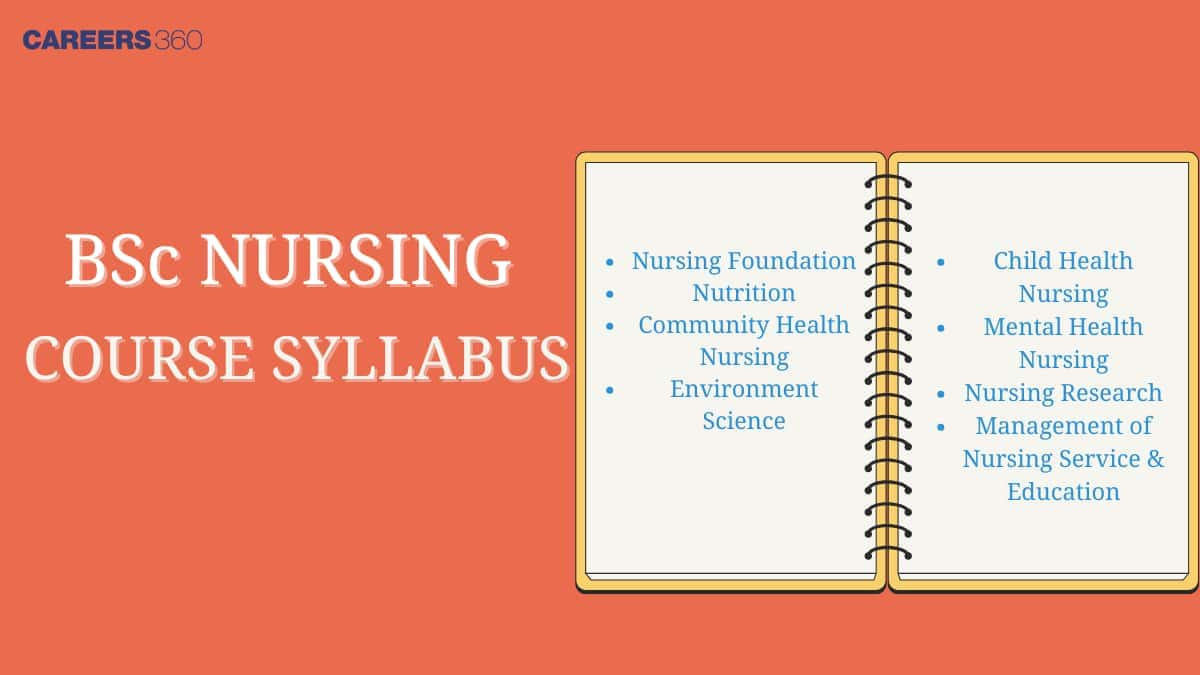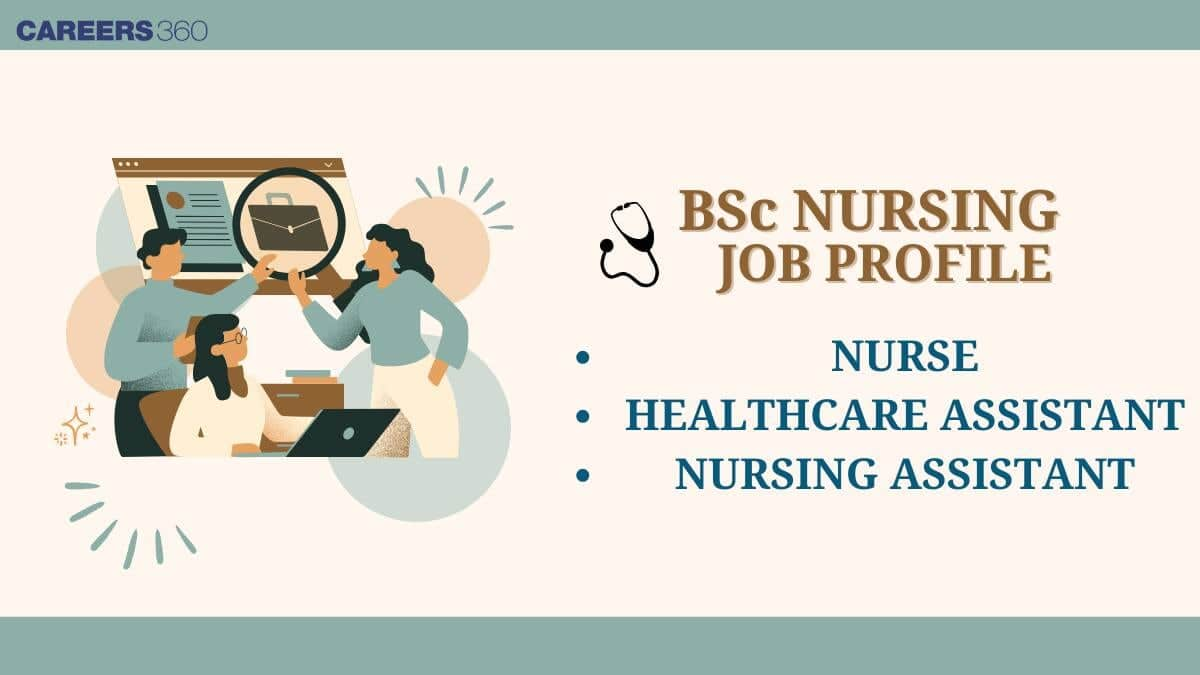RV University, Bangalore | B.Sc Admissions 2026
Highly qualified faculty from diverse academic backgrounds. Global exposure via partnerships with top international universities
BSc Nursing or Bachelor of Science in Nursing is a four-year undergraduate degree programme that prepares students for a career as a nurse. It equips learners with essential nursing skills, clinical training, and medical knowledge. BSc Nursing combines theoretical knowledge with practical skills and focuses on areas such as anatomy, physiology, pharmacology, and nursing ethics. Some of the skill sets candidates learn include patient care, managing healthcare settings, and addressing community health settings.
This Story also Contains

In India, over 1250 educational institutes offer a BSc in Nursing course, out of which 1307 colleges are private and the remaining 68 are government colleges. Some of the prominent institutes include AFMC Pune, PGIMS Rohtak, GMC Nagpur, and BJMC Pune. Students should check the official website of the provider for more information regarding the course.
To be eligible for the course, candidates should have cleared their 10+2 from a recognised institute in India. The admission procedure is mostly based on the entrance examination; AIIMS Nursing and NEET are popular entrance examinations. Some of the leading institutes offering the BSc Nursing course are AFMC Pune, PGIMS Rohtak, IGMC Shimla, and GMC Nagpur.
After pursuing nursing courses at the undergraduate level, candidates can pursue career options like Nurse, Healthcare Assistant, and Nursing Assistant. The average salary of a Nurse in India is Rs. 2.4 LPA, depending on the skills and experience of the graduate.
BSc Nursing or Bachelor of Science in Nursing is an excellent medical course after 12th Science for those aiming to become professional nurses and work in the healthcare industry. The course duration is four years, divided into eight semesters. Below is a table highlighting important details of the BSc Nursing programme.
Parameters | BSc Nursing Course Details |
|---|---|
Course Name | Bachelor of Science in Nursing |
BSc Nursing Course Duration | 4 Years |
BSc Nursing Course Type | Postgraduate |
BSc Nursing Semesters | 8 semesters |
BSc Nursing Eligibility Criteria | 10+2 in the Science stream from a recognised board |
BSc Nursing Entrance Exams | NEET UG, AIIMS Nursing, JENPAS UG |
BSc Nursing Admission Process | Entrance Examination |
BSc Nursing Average Salary | Rs. 4.2 LPA |
BSc Nursing Fees | Rs. 14,000 to Rs. 9 Lakhs |
BSc Nursing Top Recruiters | Apollo Group, Indian Nursing Council, Fortis Hospitals, Manipal Group and Medical |
BSc Nursing Job Profiles | Nurse, Registered Nurse (RN), Nurse Educator, Medical Coder, Registered Nurse (RN) - Emergency Room, Nurse - Intensive Care Unit (ICU) and Neonatal Intensive Care Unit (NICU) Registered Nurse |
Pursuing a BSc Nursing course offers numerous benefits, providing the skills for a career in clinical nursing, nursing research, and healthcare administration. The demand for qualified nursing professionals is growing, especially with the ageing population, opening opportunities in hospitals, clinics, and nursing homes worldwide.
With healthcare advancements, BSc Nursing graduates can find roles in various work environments, including research and administrative positions. The consistent demand for skilled professionals ensures job stability and career growth in the ever-expanding healthcare industry. Nursing professionals are essential for improving patient care and overall healthcare standards.
To apply for a BSc Nursing course, candidates must meet certain eligibility criteria, which may differ by institute. Usually, 10+2 in Science with PCB is required. For complete details, check the official websites. Listed below are the BSc Nursing eligibility criteria, followed by the most recognised institutes in India.
| Particulars | Values |
|---|---|
Eligibility Parameters | Details |
Educational Qualification | 10+2 in Science stream (with Physics, Chemistry and Biology as compulsory subjects) from a recognised board in India |
Minimum aggregate requirements | 50 per cent (5-10 per cent relaxation for candidates belonging to the reserved categories) |
The BSc Nursing admission process usually depends on entrance exams conducted by individual institutes. Interested candidates must fill out the BSc Nursing application form, available online and offline. Admission is based on entrance scores, eligibility criteria, and document verification. The detailed BSc Nursing admission steps are provided below for reference.
Also read: Diploma in Nursing
The BSc Nursing admission is provided by most institutions based on their score in the qualifying exam and the BSc Nursing entrance exam. Candidates are required to appear and acquire a prescribed BSc Nursing cut-off mark in the entrance test. Here, the top BSc Nursing entrance exams are given in the table below.
| Exam Name | Conducting Body | Exam Date |
|---|---|---|
National Testing Agency (NTA) | ||
National Testing Agency | ||
All India Institute of Medical Sciences, New Delhi | ||
West Bengal Joint Entrance Examinations Board (WBJEEB) | - |
The BSc Nursing cut-off is the minimum score required for admission to top BSc Nursing colleges. It varies across institutes based on the entrance exam difficulty, number of applicants, and the reputation of the institution. Meeting the BSc Nursing cut-off is crucial for securing admission to this healthcare course.

The BSc Nursing syllabus covers key subjects like Nursing Foundation, Anatomy, Physiology, Nutrition, Microbiology, and Community Health Nursing. It is designed to build clinical and theoretical knowledge essential for nursing careers. Below is the detailed BSc Nursing syllabus as followed by Bharati Vidyapeeth University for academic reference.
The BSc Nursing First Year syllabus introduces learners to fundamental subjects essential for a strong base in healthcare. It includes theoretical and practical topics such as Anatomy, Physiology, Nursing Foundation, and Psychology. These subjects aim to build foundational medical knowledge and communication skills in students.
Related- Allied health sciences have millions of jobs, but go unnoticed in the craze for MBBS
The second-year BSc Nursing syllabus focuses on expanding clinical knowledge and developing specialised nursing skills. It includes subjects like Pharmacology, Pathology, Medical-Surgical Nursing, and Community Health Nursing. Learners also study Microbiology and Environmental Science, along with practical training and co-curricular activities.
The third-year BSc Nursing syllabus focuses on advanced nursing care and communication skills. It includes Medical-Surgical Nursing, Child Health Nursing, and Mental Health Nursing. The curriculum also covers Educational Technology and Communication, helping learners gain essential teaching and interaction skills required in healthcare environments.
The fourth year of the BSc Nursing syllabus is designed to refine the practical and theoretical skills essential for nursing practice. It focuses on improving clinical skills, research abilities, and the management of nursing services. This year provides students with the knowledge needed for leadership and specialised roles in healthcare.
The fee structure for a BSc Nursing course depends on the institute type, the course chosen, and the location of the institute. Candidates aspiring to pursue a BSc Nursing course must know the fee details of the institute before applying for the course. The fee of a BSc Nursing course typically ranges from Rs. 14,000 to Rs. 9 Lakhs.
The BSc Nursing course opens various career opportunities for the graduates. After graduation, candidates can apply at both private and government healthcare units, hospitals, clinics, nursing units, and rehabilitation centres. Students can also opt for higher education; some of the popular degrees are MSc in Nursing or PhD in relevant disciplines.
Students can also opt for several similar or related specialisations after graduation. Some of them are paediatric nursing, critical care nursing, and oncology. BSc Nursing also offers good research skills; candidates interested in becoming lecturers or professors can opt for this course. Not only in India, but candidates can also explore jobs in foreign countries.

BSc Nursing graduates can opt for various career options in the healthcare sector. Students are provided with the skills and knowledge to provide care to patients. Students can work in different fields as a Nurse, Nurse Educators, and Nursing Assistants. Students can work at various places such as Hospitals, Clinics, and the pharmacy sector.
| Job Profiles | Job Description | Average Salary |
|---|---|---|
A nurse is a professional who has a Nursing education, such as a BSc in Nursing degree, and is registered by a governing authority to practise nursing in the country. He or she supports the patients who require medical treatment, helps patients with their recovery and also helps doctors and surgeons in their daily duties and activities. | Rs. 2.7 LPA | |
Healthcare Assistant | A healthcare assistant is a healthcare professional who works with a medical team to offer the best treatment and care to patients. He or she helps the doctors and other healthcare professionals with their daily duties by maintaining records and taking care of all the medical instruments. | Rs. 2.4 LPA |
Nursing Assistant | A Nursing assistant is a healthcare professional who helps patients with their daily care. He or she works under the supervision of a Nurse and helps the patients in improving their daily routine activities such as bathing, grooming, and eating. | Rs.2.8 LPA |
Salary Source: AmbitionBox
Related- Is your paramedical course legit? Fake ‘councils’ flood allied health sciences
After earning a BSc Nursing degree, many individuals choose to continue their education in the healthcare and management fields. Postgraduate courses help improve professional skills, expand career opportunities, and increase earning potential. These higher studies are ideal for those aiming for leadership roles in the healthcare industry. Some popular options are listed below.
The BSc Nursing course allows students to acquire the knowledge and skills necessary to provide quality and holistic care to patients of all ages and backgrounds. The course also develops the student’s critical thinking, communication, leadership, and ethical values, which are essential in the nursing profession.
Students can work both in India and abroad, and they can work in various sectors such as hospitals, clinics, schools, NGOs, and the military. Students can also choose the specialisation of Nursing based on their interests and future goals. After completing a BSc Nursing course, students can pursue an MSc in Nursing or related specialisations.
Many private institutes in India offer BSc Nursing courses. Private institutes are generally more expensive than public institutes. Private colleges are known to provide quality education along with state-of-the-art amenities and infrastructure for the comfort and convenience of the students.
| Colleges | Fees |
|---|---|
Rs. 9 Lakhs | |
Rs. 3.27 Lakhs | |
- | |
Rs. 6.46 Lakhs | |
- | |
Rs. 2.77 Lakhs | |
Rs. 4.20 Lakhs | |
Rs. 4.05 Lakhs | |
Rs. 2.80 Lakhs | |
- |
Attending a government-run college is less expensive than attending a BSc Nursing private college, and government BSc Nursing colleges are well-known for their high academic standards throughout India. The following are some of the best government BSc Nursing colleges, along with their respective fees.
| Colleges | Fees |
|---|---|
- | |
Rs. 62,920 | |
Rs. 66.250 | |
- | |
- | |
- | |
Rs. 2.64 Lakhs | |
Regional Institute of Paramedical and Nursing Sciences, Aizawl | Rs. 14,000 |
Rs. 1.60 Lakhs | |
Rs. 3.60 Lakhs |
The BSc Nursing course prepares students to become qualified nurses. The course provides both theoretical and practical knowledge of various aspects of nursing. The course also provides the students with both personal and professional skills.
Frequently Asked Questions (FAQs)
The basic eligibilty requirements for the BSc Nursing course is to pass class 12th with a minimum of 50 per cent aggregate score with Physics, Chemistry, Biology, and English (PCBE) from any recognised board in India.
B Sc nursing full form is Bachelor of Science in Nursing, an undergraduate degree programme. BSc Nursing or Bachelor of Science in Nursing is a four-year undergraduate course in the field of medical science. Aspirants who have completed 10+2 with biology or have completed a diploma in Nursing are eligible to apply for B.Sc Nursing.
Subjects in the B Sc nursing syllabus are Cell Structure and Function, Genetic Basis of Inheritance, Living and Nonliving, Origin and Evolution of Life, Atomic Structure, Elements and Compounds, Chemical Bonding, Periodic Table, States of Matter, Important Concepts in chemistry.
The colleges that offer B Sc nursing courses are AFMC Pune - GMC Nagpur, GMC Nagpur, IGMC Shimla, PGIMS Rohtak, and TDMC Alappuzha.
Candidates should be at least 17 years old on 3rd December of the year in which admission is being sought.
The top career options in the field of B.Sc Nursing are Nurse, Nurse Assistant, and Healthcare Assistant,
The top recruiters in the field of B.Sc Nursing are Apollo Group, AIIMS, Fortis Hospitals, Medica, Manipal Group and Indian Nursing Council.
As per the basic eligibility criteria, candidates must have completed 10+2 in PCB with at least 50 per cent in aggregate.
The top entrance examinations in the field of B.Sc Nursing are NEET-UG and AIIMS Nursing exams.
Candidates can opt for M.Sc in Nursing. Also, courses in healthcare and hospital management are also good options to go for.
Among top 100 Universities Globally in the Times Higher Education (THE) Interdisciplinary Science Rankings 2026
Among top 100 Universities Globally in the Times Higher Education (THE) Interdisciplinary Science Rankings 2026
Master's programs in Sustainability Science and Practice; Climate Change Science and Practice; Urban Economic and Infrastructure Development; Human Development Policy and Practice
100% Placements Assistance | 1200+ Recruiters
Ranked #18 by NIRF, NAAC A++ Accredited | Unmatched clinical exposure with over 7 lakh patients yearly
NAAC A+ Accredited | Among top 2% Universities Globally (QS World University Rankings 2026)